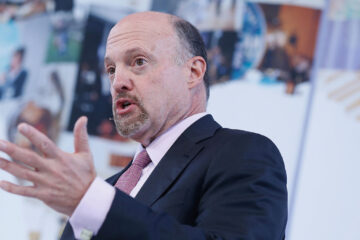Warren Buffett’s retirement announcement was not what investors wanted.
During the middle of Thursday’s trading, shares of Berkshire Hathaway (BRK.A) and (BRK.B) had fallen as much as 10.3% from all-time intraday highs of $812,855 and $539.80 on May 2.
May 2 was the day before some 40,000 investors and fans jammed the company’s annual meeting, held in an Omaha, Neb., arena.
At the very end of the meeting, Buffett, who has been CEO of the company for more than 60 years, announced he will step aside on Dec. 31.
Greg Abel is slated to replace Buffett, who will serve as chairman.
The shares fell nearly 5% on May 5, the first day of trading after Buffett’s announcement and have stumbled steadily since.
Perhaps some good news: shares of both classes ended Friday about 1% higher at $740,396 and $493.53, respectively. So, maybe the stocks’ downturn may have ended.
Related: Analyst resets stocks, gold outlook after rally
Berkshire benefits from Wall Street rally
Berkshire’s uptick was probably helped by Friday’s big market rally. The gains, however, came after five straight days of declines for both share classes.
In fact, the A shares have shown just nine gains since May 2. The B shares rose just 10 times in those 24 days. And the stocks are down 8.9% and 8.6%, respectively, in those 24 days, while the Standard & Poor’s 500 Index is up 5.5%.
But remember this. Year to date, the A shares are up 8.7% and the B shares are up 8.9%. The S&P 500’s 2025 gain so far: just 2%.
Suffering from Buffett withdrawal
One explanation for the decline is investors are having trouble dealing with the possibility that Buffett won’t be the face of the company.
Buffett evolved into a folk hero for many investors partly because of his folksy, plainspoken manner, especially as he chaired the company’s annual meeting.
Plus, his rigorous devotion to value investing and the company’s investment track record built a company that still has a $1 trillion-plus market capitalization despite the stock’s decline.
Berkshire’s investment in Apple (AAPL) has been legendarily profitable — in part because Buffett resisted investing in technology for years until his partner, the late Charlie Munger, convinced him Apple was a consumer company.
Apple CEO Tim Cook has been a regular attendee at the Berkshire annual meeting.
Buffett himself is now reputed to be worth more than $157 billion.
All this in the face of multiple market slumps and recessions. And that reputation gave him the ability to move markets all by himself.
Berkshire investors did suffer with everyone else during the 2008 market crash; the shares fell as much as 48% between a top in October 2008 until their bottom in March 2009.
Buffett acknowledges toll of years
Buffett is 94, and, by his own admission in an interview with The Wall Street Journal, he’s slowing down. He said Abel is not only terrifically able, but, Buffett added, Abel has a lot more energy.
One other trait Buffett praised. Abel is willing to get directly involved with subsidiaries in need of help.
Attendees at the Berkshire Hathaway annual shareholders meeting in Omaha, Neb., on May 3.
Two more issues may be affecting Berkshire shares:
Berkshire was downgraded modestly by UBS analyst Brian Meredith, who still rates either share class a buy. But dividend income from its investments might not be as strong as in previous years.Berkshire is not expected to buy back shares any time soon. Companies do that to boost support stock prices. Buffett thinks Berkshire’s current intrinsic value is 9% higher than the current stock prices.
Fund manager buys and sells
See a big stock rally ahead? Be patient, money manager saysFund manager, skeptical of AI, backs shocking stockVeteran fund manager sends surprising message on the weak dollar
Abel, who just turned 63, has been Buffett’s designated successor since 2021.
He is now vice chairman of Berkshire Hathaway and CEO of Berkshire Hathaway Energy, the holding company for Berkshire’s electric utility operations.
Related: Tech IPO smash reveals something shocking
Another personnel change ahead
At the same time, Berkshire Hathaway may be facing another personnel issue. Ajit Jain, the head of Berkshire Hathaway’s big insurance operation, is thinking about retiring, and there are discussions on how to replace him.
Jain, now 73, joined Berkshire Hathaway in 1986 while in his 30s. And he has reportedly suggested a list of possible replacements, The Journal reported.
The insurance business is Berkshire’s largest business unit, with upwards of 20 separate subsidiaries. Best known: auto insurer Geico. The business is hugely profitable and is the source of funds that Buffett and Munger invested so profitably.
Berkshire Hathaway has evolved into a huge conglomerate, built around insurance. Holdings include the Burlington Northern Santa Fe railroad, the insurance business, electric utilities, retail companies, Benjamin Moore, the paint manufacturer, Dairy Queen and Duracell batteries.
Related: Veteran fund manager who predicted April rally updates S&P 500 forecast


